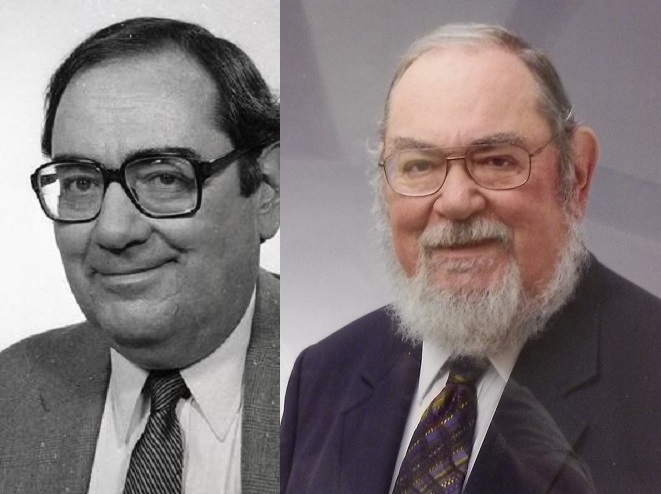Jim Keat, champion of open government and a journalist’s best friend
Jim Keat in his early days at the Sun and after his retirement.
By Barry Rascovar
For MarylandReporter.com
Every Maryland journalist who has filed a freedom of information request or challenged efforts by officials to keep public deliberations secret owes a debt of gratitude to Jim Keat, who passed away July 6 after a prolonged bout with cancer.
Keat passionately detested public secrecy. He led the fight to enlarge and put teeth in Maryland’s Opening Meetings Act and its Freedom of Information Act.
Investigative journalists and State House reporters would have been thwarted in their demands for government documents and entree to state and local government meetings were it not for Keat’s fierce determination to remove the shadows from official public actions.
Close ties
I knew Jim longer than anyone in my newspaper career. When I held down a summer internship at the Baltimore Sunday Sun after graduating from college, Jim gave me a shot at a job he could offer me once I completed my master’s degree at Columbia University.
The job entailed editing news-analysis copy for a brand-new Sunday opinion section Keat was starting from scratch, called Perspective. I botched the editing test quite badly but you’d never know it from the way Keat diplomatically suggested I stick to learning the reporting trade.
I’m eternally grateful for that rejection, since it saved me from a life on the copy desk far from what I really wanted to do: report on political and governmental news of the day.
Keat later served 16 years in a key but unheralded role as assistant managing editor for The Sun’s news sections. Every newspaper has someone like Jim Keat, whose name is not widely known to the public but who keeps the complex internal workings of a newsroom in sync and on time.
Superb news judgment
No news-gathering problem was too big or too small for Keat to handle. He had superb news judgment and vast knowledge of foreign and national affairs as well as what was “hot” on the local scene.
He served as a buffer for journalists when things got heated in editorial meetings. Keat’s boss, Paul Banker, was a reclusive man of few words who rarely dealt with the local staff. It was left to Jim to serve as an intermediary and mentor to us lowly city-desk reporters.
When I joined the newspaper’s Washington Bureau, Keat became our go-to guy for reporters with complaints about how their stories were handled and for those lobbying to pursue tips that might lead to a Page One “scoop.” He saved my hide on numerous occasions.
Then when Jim was winding up his nearly 40 years with the Baltimore Sun, he joined me and his old pal Joe Sterne in the editorial department, where he coordinated daily production activities of the opinion pages. He edited letters to the editor and pounded out well-crafted editorials with an élan and rapidity that spoke to his skills as a consummate journalist.
Work on open government set him apart
But it was Jim’s sterling work on behalf of government openness, both at the newspaper and in retirement, that set him apart.
Keat once admitted that he was “frustrated by the inability of the people, not just newspapers, to find out what the government is doing.”
He became a leader of the Maryland-Delaware-D.C. Press Association’s freedom of information lobbying in the Annapolis State House and before county and city councils.
He led two MDDC public records audits of Maryland agencies that demonstrated the closed-door nature of bureaucratic fiefdoms. Keat also plunged into public battles over cameras in the courtroom, court records access and the necessity of regular government audits to test if agency records indeed are accessible to the press and public.
Keat became a constant spectator and testifier at hearings that unmasked weaknesses in Maryland’s Opening Meetings Act. Throughout his long career he remained a passionate and demanding voice for freedom of the press and government openness.
Thank Jim
So the next time you read an expose or article on government wrongdoing made possible by documents obtained through Freedom of Information requests, take a moment to thank Jim Keat.
And when you read stories about officials unsuccessfully trying to slam the doors to public meetings, again thank Jim Keat.
He was a Maryland journalist’s best friend. Keat’s relentless work advocating for open access to the people’s government made a lasting contribution to this state.
Barry Rascovar’s blog is www.politicalmaryland.com. He can be contacted at [email protected]

MarylandReporter.com is a daily news website produced by journalists committed to making state government as open, transparent, accountable and responsive as possible – in deed, not just in promise. We believe the people who pay for this government are entitled to have their money spent in an efficient and effective way, and that they are entitled to keep as much of their hard-earned dollars as they possibly can.

